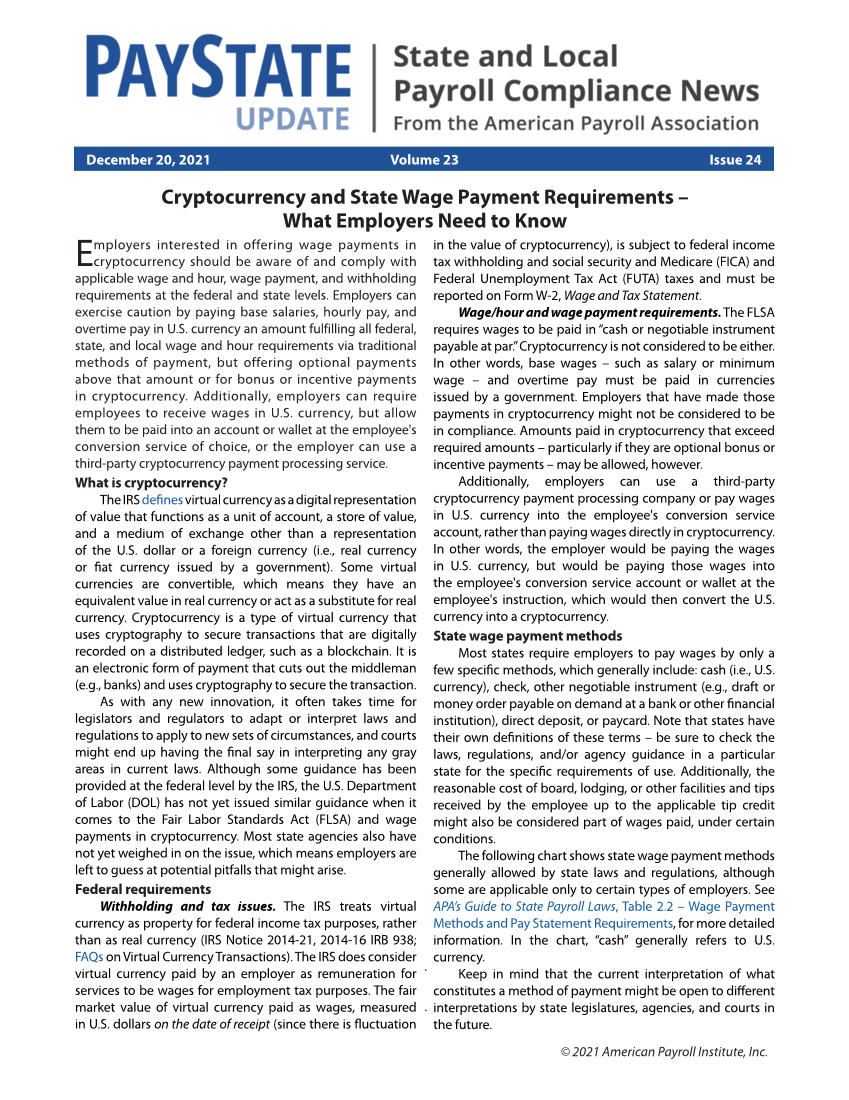© 2021 American Payroll Institute, Inc. Cryptocurrency and State Wage Payment Requirements – What Employers Need to Know Employers interested in offering wage payments in cryptocurrency should be aware of and comply with applicable wage and hour, wage payment, and withholding requirements at the federal and state levels. Employers can exercise caution by paying base salaries, hourly pay, and overtime pay in U.S. currency an amount fulfilling all federal, state, and local wage and hour requirements via traditional methods of payment, but offering optional payments above that amount or for bonus or incentive payments in cryptocurrency. Additionally, employers can require employees to receive wages in U.S. currency, but allow them to be paid into an account or wallet at the employee's conversion service of choice, or the employer can use a third-party cryptocurrency payment processing service. What is cryptocurrency? The IRS defines virtual currency as a digital representation of value that functions as a unit of account, a store of value, and a medium of exchange other than a representation of the U.S. dollar or a foreign currency (i.e., real currency or fiat currency issued by a government). Some virtual currencies are convertible, which means they have an equivalent value in real currency or act as a substitute for real currency. Cryptocurrency is a type of virtual currency that uses cryptography to secure transactions that are digitally recorded on a distributed ledger, such as a blockchain. It is an electronic form of payment that cuts out the middleman (e.g., banks) and uses cryptography to secure the transaction. As with any new innovation, it often takes time for legislators and regulators to adapt or interpret laws and regulations to apply to new sets of circumstances, and courts might end up having the final say in interpreting any gray areas in current laws. Although some guidance has been provided at the federal level by the IRS, the U.S. Department of Labor (DOL) has not yet issued similar guidance when it comes to the Fair Labor Standards Act (FLSA) and wage payments in cryptocurrency. Most state agencies also have not yet weighed in on the issue, which means employers are left to guess at potential pitfalls that might arise. Federal requirements Withholding and tax issues. The IRS treats virtual currency as property for federal income tax purposes, rather than as real currency (IRS Notice 2014-21, 2014-16 IRB 938 FAQs on Virtual Currency Transactions). The IRS does consider virtual currency paid by an employer as remuneration for services to be wages for employment tax purposes. The fair market value of virtual currency paid as wages, measured in U.S. dollars on the date of receipt (since there is fluctuation in the value of cryptocurrency), is subject to federal income tax withholding and social security and Medicare (FICA) and Federal Unemployment Tax Act (FUTA) taxes and must be reported on Form W-2, Wage and Tax Statement. Wage/hour and wage payment requirements. The FLSA requires wages to be paid in “cash or negotiable instrument payable at par.” Cryptocurrency is not considered to be either. In other words, base wages – such as salary or minimum wage – and overtime pay must be paid in currencies issued by a government. Employers that have made those payments in cryptocurrency might not be considered to be in compliance. Amounts paid in cryptocurrency that exceed required amounts – particularly if they are optional bonus or incentive payments – may be allowed, however. Additionally, employers can use a third-party cryptocurrency payment processing company or pay wages in U.S. currency into the employee's conversion service account, rather than paying wages directly in cryptocurrency. In other words, the employer would be paying the wages in U.S. currency, but would be paying those wages into the employee's conversion service account or wallet at the employee's instruction, which would then convert the U.S. currency into a cryptocurrency. State wage payment methods Most states require employers to pay wages by only a few specific methods, which generally include: cash (i.e., U.S. currency), check, other negotiable instrument (e.g., draft or money order payable on demand at a bank or other financial institution), direct deposit, or paycard. Note that states have their own definitions of these terms – be sure to check the laws, regulations, and/or agency guidance in a particular state for the specific requirements of use. Additionally, the reasonable cost of board, lodging, or other facilities and tips received by the employee up to the applicable tip credit might also be considered part of wages paid, under certain conditions. The following chart shows state wage payment methods generally allowed by state laws and regulations, although some are applicable only to certain types of employers. See APA’s Guide to State Payroll Laws, Table 2.2 – Wage Payment Methods and Pay Statement Requirements, for more detailed information. In the chart, “cash” generally refers to U.S. currency. Keep in mind that the current interpretation of what constitutes a method of payment might be open to different interpretations by state legislatures, agencies, and courts in the future. December 20, 2021 Volume 23 Issue 24
Printed for: PayrollOrg Bookshelf © 2024 American Payroll Institute, Inc. All Rights reserved. From: PayrollOrg Digital Publications (bookshelf.payroll.org)











